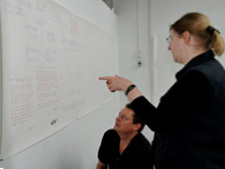Thompson Rivers University has received funding from the Social Science and Humanities Research Council (SSHRC) of Canada to make interdisciplinary research visible.
The SSHRC Standard Research Grant of $102,000 was awarded to TRU professors Will Garrett-Petts (English & Modern Languages) and Rachel Nash (Journalism, Communication and New Media). The grant will fund the “Making Interdisciplinary Research Visible” research program from 2010 to 2013, which includes supporting the training of three student research assistants and helps reinforce TRU’s national reputation as a centre for interdisciplinary research and the study of artistic inquiry.

Will Garrett-Petts and Adelheid Mers from the Art Institute of Chicago. Adelheid is one of the artist-researchers participating in the study.
“There is ample evidence that we need to integrate visual ways of knowing and representing knowledge throughout life. Universities have, until recently, singled out print as the privileged medium for intellectual work,” said Garrett-Petts. “Things are changing, however. Cultural theorists, and especially those involved in interdisciplinary and multidisciplinary studies, are beginning to acknowledge a ‘visual turn’ in academic and creative work.”
According to Garrett-Petts, the pressure to accommodate “non-linguistic” ways of knowing and communicating has become particularly urgent in Canada, since the major funding agency for the humanities and social sciences (The Social Sciences and Humanities Research Council of Canada) is now funding artist-researchers alongside more traditional academics. In addition, the advent of Ph.D. programs in studio art—in Europe and, more recently, in North America—has helped encourage and facilitate the integration of artist-researchers in an increasing number of interdisciplinary initiatives. Similarly, the business community is increasingly drawing upon artists and artistic practices to infuse creativity into the workplace.
“Making Interdisciplinary Research Visible” is a newly-funded program of research interested in how the practice of artistic inquiry extends and complicates interdisciplinary research and collaborative writing in the humanities and social sciences.
“There is ample evidence that we need to integrate visual ways of knowing and representing knowledge throughout life. Universities have, until recently, singled out print as the privileged medium for intellectual work,”” – Dr. Will Garrett-Petts, Professor
There is a rich tradition of research on the visual arts, but there is relatively little known about research for visual art (the array of practices that both inform and constitute artistic production) or research through visual art (where artistic practice becomes a vehicle for producing and presenting new knowledge).
Garrett-Petts and Nash begin with a study of “artists’ statements,” formal verbal descriptions written by artists to introduce and explain their visual work. The artist’s statement is a key document for understanding how artists translate visual thinking and production into verbal form. British Columbia’s three principal art galleries have given the researchers access to their respective collections for this purpose, and the researchers have already begun an international survey of art schools teaching the writing of artist statements. Findings from this examination of these texts and survey results will be used as the basis for an ethnographic study on the changing role of writing in the interdisciplinary work of three prominent groups of artist-researchers—in Canada, the United States, and Europe.
Working with the interdisciplinary teams, Garrett-Petts and Nash will expand their findings from the study of artist statements and artists’ writing to the broader set of issues posed by the role of visual artists as collaborative researchers. The results of this study will be of interest to scholarly and general audiences, including language researchers, art educators, community arts organizers, curators, artists, and especially those working in interdisciplinary collaborations.
Contact
Dr. Will Garrett-Petts
Professor, English and Modern Languages
(p) 250.828.5248
(e)wpetts@tru.ca
Dr. Rachel Nash
Professor, Journalism, Communication and New Media
(e) rnash@tru.ca

